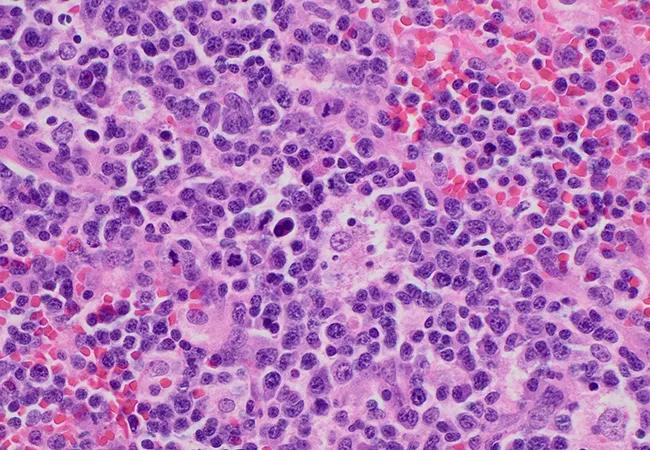Multidisciplinary team tackles the management of 84 uncommon cancers and blood disorders

Image content: This image is available to view online.
View image online (https://assets.clevelandclinic.org/transform/94a0cca2-cbf5-44d0-a3e7-baed27396a0b/Mukherjee-CQD-654x450-1_jpg)
Mukherjee CQD 654×450
Approximately 20% of all patients diagnosed with cancer in the United States have a rare form of the disease. For such patients, as well as those with rare blood disorders, access to clinical and pathologic expertise is often limited due to the rarity of their diagnosis. These patients often require personalized treatment options that depend on the activation of specific pathways or the identification of gene mutations.
Advertisement
Cleveland Clinic is a non-profit academic medical center. Advertising on our site helps support our mission. We do not endorse non-Cleveland Clinic products or services. Policy
To address the challenges faced by those with rare cancers, Cleveland Clinic has developed a Rare Cancers and Blood Diseases Program designed to harness the expertise of highly subspecialized medical and radiation oncologists, surgeons, radiologists, pathologists, pharmacists and social workers. The program uses a restrictive definition for rare cancers that includes only cancers that have an overall annual crude incidence rate of fewer than two cases per 100,000 people. This unique multidisciplinary program provides patients with the rarest of conditions access to extensive diagnostic capabilities, comprehensive genomic analysis, approved targeted treatments and clinical trials focused on the development of potentially groundbreaking therapies.
Few cancer centers have access to the level of expertise, research infrastructure and portfolio of clinical trials needed to effectively diagnose and treat these uncommon diseases, explains hematologist and medical oncologist Sudipto Mukherjee, MD, PhD, MPH. As a result, these patients often visit multiple institutions and are faced with long waiting periods when seeking solutions to their complex medical disorders. Unfortunately, rare diseases can be difficult and time-consuming to diagnose. This means that they are often detected late – a problem that contributes to delayed treatment, poor quality of life and less-than-optimal outcomes.
“Because some of these rare cancers involve multiple organ systems, we developed a physician disease matrix that integrates multiple medical specialties,” explains Dr. Mukherjee, who directs the program at Cleveland Clinic’s Taussig Cancer Institute. “Our efforts to establish a separate stand-alone program for rare diseases and cancers have resulted in an impressive, steady increase in patient volumes over the past three years.”
Advertisement
The clinical, surgical and pathological expertise developed by the program’s physicians has continued to evolve thanks to the number and variety of cases they see, adds Dr. Mukherjee. Since its creation in 2018, the program has grown to serve more than 150 to 200 patients with rare cancers or blood diseases annually.
Before the Rare Cancers and Blood Diseases Program was developed, patients were frequently assigned to a clinician who may – or may not – have a clinical or research interest in that patient’s particular disease, Dr. Mukherjee explains.
“We have changed our workflow so that when a patient is referred or presents with any one of the 84 diseases we manage, the scheduling team can quickly connect the patient with the concerned physicians who specialize in that particular disease,” he explains. “This fine-tuned approach has dramatically improved patient access and the speed at which we can definitively establish or rule out a diagnosis. It has also allowed us to minimize clinical ‘shopping’ by managing patients in a much more efficient and convenient way.”
Because patient access is one of the key goals of Dr. Mukherjee’s team, any rare cancer patient referred to the program is seen within five business days. Patients gain access to the program via several paths, including referrals from support or advocacy groups, and other providers and Cleveland Clinic patients.
Ultimately, the aim is to shorten the time to accurate diagnosis and improve outcomes in those with rare diseases. Dr. Mukherjee adds, “I would like to see improvements in these metrics soon. For example, extensive genomic analysis is now routinely performed for almost all rare cancers and blood conditions. In almost every instance, patients with targetable mutations are either enrolled in a clinical trial or treated with FDA-approved targeted therapies.”
Advertisement
Because some diseases have no approved treatment, enrollment in a clinical trial of an experimental therapy is sometimes a patient’s only option. Patients are more willing to travel for medical care when they are provided routine access to clinical research, Dr. Mukherjee adds.
Recently published studies involving research conducted at the Rare Cancers and Blood Diseases Program include:
A number of studies involving novel blood diseases and rare solid and hematologic malignancies are ongoing or planned.
Advertisement
Advertisement
Clinical trials and de-escalation strategies
Combination therapy improves outcomes, but lobular patients still do worse overall than ductal counterparts
Bringing empathy and evidence-based practice to addiction medicine
Supplemental screening for dense breasts
Combining advanced imaging with targeted therapy in prostate cancer and neuroendocrine tumors
Early results show strong clinical benefit rates
The shifting role of cell therapy and steroids in the relapsed/refractory setting
Radiation therapy helped shrink hand nodules and improve functionality